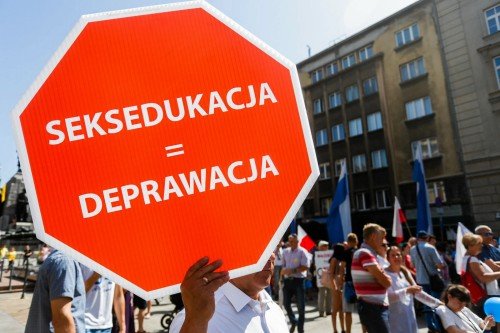
Introduction:
Sex education is a fundamental aspect of a well-rounded education, providing young people with the knowledge and skills they need to navigate their sexual and reproductive health. However, in Poland, the current state of sex education leaves much to be desired. This blog post aims to shed light on the existing challenges and advocate for comprehensive reform in sex education policies in Poland.
Limited Curriculum:
Poland's sex education curriculum is predominantly abstinence-focused, emphasizing the importance of avoiding sexual activity outside of marriage. Such an approach fails to address the realities of young people's lives, their questions, and their need for accurate information. As a result, many students graduate without a comprehensive understanding of sexual health, consent, contraception, and sexually transmitted infections (STIs).
One of the major challenges in sex education in Poland is the limited curriculum that fails to provide comprehensive information to students. The current curriculum primarily focuses on abstinence as the sole method of preventing unwanted pregnancies and STIs. While abstinence is an important aspect of sexual health, it is crucial to acknowledge that not all individuals will choose or be able to abstain from sexual activity.
By solely promoting abstinence, the curriculum overlooks crucial topics such as contraception methods, safe sex practices, and information about STIs. This lack of comprehensive education leaves students ill-prepared to make informed decisions about their sexual health and can contribute to higher rates of unintended pregnancies and the spread of STIs.
Furthermore, the limited curriculum fails to address important topics like consent, healthy relationships, and communication skills. These subjects are essential for students to develop respectful and responsible attitudes towards sex and relationships.
It is important to understand that sex education should not encourage or promote early sexual activity but should instead provide students with accurate information to make responsible choices when the time comes. Comprehensive sex education has been shown to be effective in reducing rates of unplanned pregnancies, STIs, and sexual violence, while also promoting healthier relationships and positive sexual behaviors.
To address the issue of limited curriculum, it is crucial to revise and expand the sex education program in Poland. A comprehensive curriculum should include age-appropriate information on topics such as reproductive anatomy, contraception methods, STIs, consent, healthy relationships, communication skills, and LGBTQ+ inclusive education. This inclusive approach ensures that all students receive the necessary knowledge and skills to make informed decisions about their sexual health, regardless of their sexual orientation or gender identity.
Additionally, involving experts in the field of sexual health and education, along with input from parents, students, and advocacy groups, can help shape a more comprehensive and evidence-based curriculum. Providing proper training and support to educators is also vital to ensure they have the necessary knowledge and confidence to teach these topics effectively.
By expanding the curriculum and providing comprehensive sex education, Poland can empower its young people with the knowledge and skills they need to make informed decisions about their sexual health, leading to healthier and more responsible behaviors in the long run.
Taboo and Stigma:
Sexuality remains a taboo subject in Polish society, leading to widespread stigma and misconceptions. This cultural attitude makes it challenging for educators to openly discuss topics related to sex and relationships. Consequently, students often receive incomplete or misleading information from unreliable sources, leaving them vulnerable to misinformation and risky behaviors.
Inadequate Teacher Training:
Many educators in Poland feel ill-equipped to teach sex education due to a lack of proper training and support. Consequently, they may avoid or skim over crucial topics, perpetuating knowledge gaps and reinforcing societal taboos. Comprehensive training programs for teachers are necessary to ensure they can confidently and accurately educate students about sexual health.
LGBTQ+ Inclusivity:
Poland's sex education curriculum largely overlooks the specific needs and experiences of LGBTQ+ individuals. This omission not only erases their existence but also denies them vital information about their sexual health. An inclusive curriculum should address diverse sexual orientations and gender identities, promote acceptance, and foster a safe environment for all students.
Importance of Comprehensive Sex Education:
Comprehensive sex education programs have proven to be effective in reducing risky behaviors, promoting healthy relationships, and empowering young people to make informed decisions about their bodies and sexual health. By providing accurate and inclusive information, comprehensive sex education equips students with the knowledge and skills they need to lead safe, responsible, and fulfilling lives.
Conclusion:
The state of sex education in Poland requires urgent attention and reform. By implementing comprehensive, evidence-based curricula, destigmatizing discussions around sex and relationships, and providing adequate training for educators, Poland can ensure that its young people receive accurate, inclusive, and age-appropriate information about sexual health. Empowering the next generation with the knowledge they need will contribute to healthier and safer communities, while fostering a society that embraces sexual diversity, consent, and respect for all individuals.







